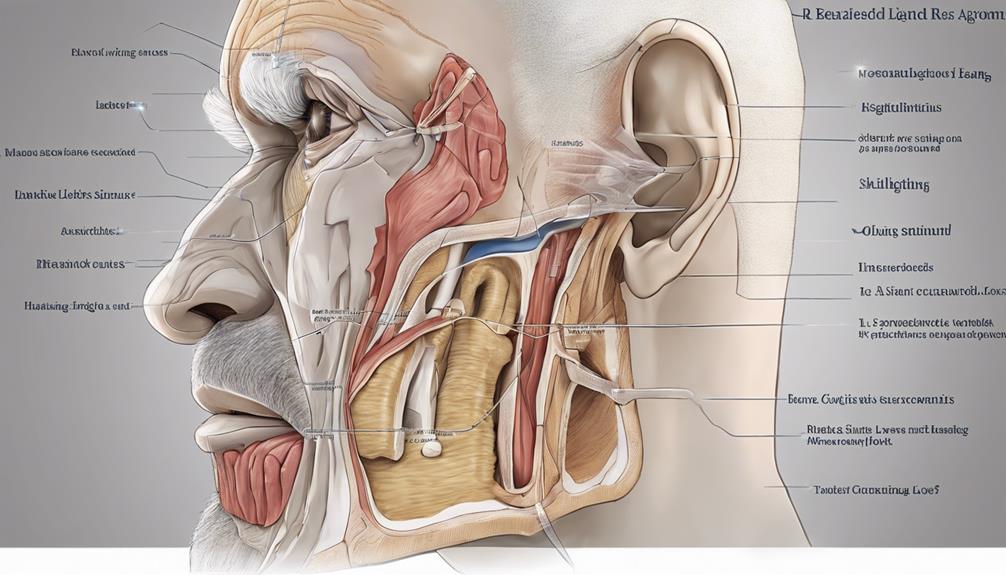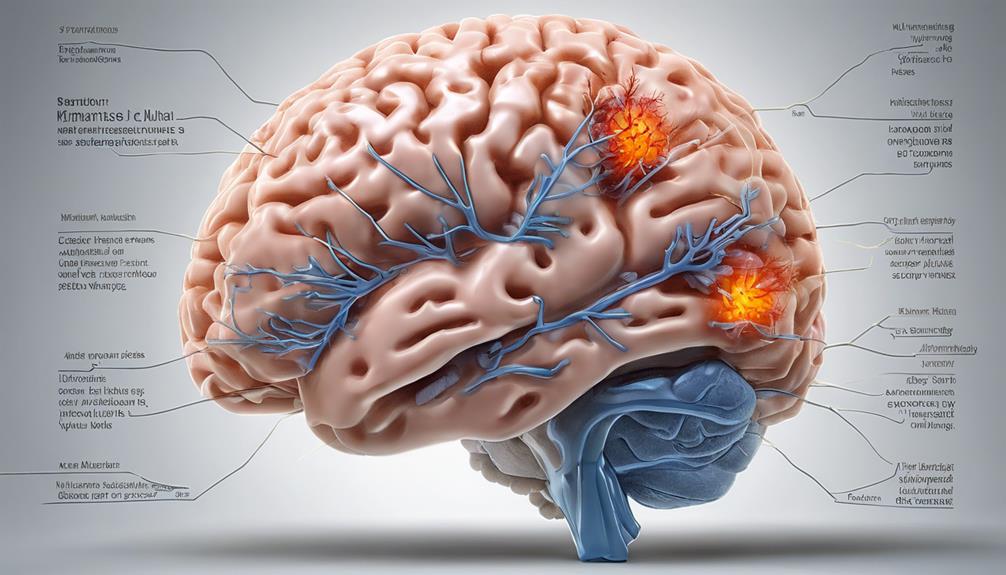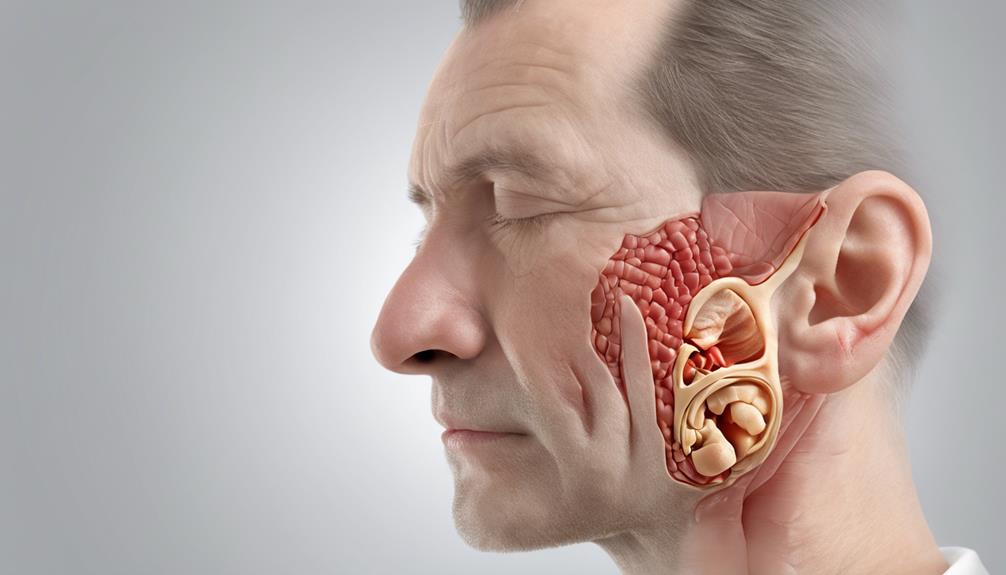Understanding how sinusitis affects hearing could reveal unexpected connections in the body.
As we explore the intricate relationship between sinus inflammation and auditory function, a deeper understanding emerges.
The repercussions of untreated sinusitis on hearing health may surprise many.
Stay tuned to uncover expert insights on managing sinusitis-induced hearing issues and safeguarding your auditory well-being effectively.
Key Takeaways
- Prompt treatment of sinusitis can prevent temporary and permanent hearing loss.
- Consulting an ENT specialist is crucial for managing sinusitis-induced hearing issues.
- Timely intervention is essential to alleviate sinus-related hearing complications.
- Effective sinusitis management helps restore optimal hearing function.
Sinusitis and Its Impact on Hearing
Swelling and inflammation in the sinuses can have a direct impact on hearing, potentially leading to temporary hearing loss due to Eustachian tube dysfunction. When sinuses become inflamed, they can produce excess mucus, which can block the Eustachian tube—a vital connection between the middle ear and the back of the nose. This blockage can result in a feeling of fullness in the ears, decreased ability to hear sounds clearly, and even pain or pressure in the ears.
Individuals experiencing sinusitis may notice changes in their hearing, such as sounds seeming muffled or distant. The pressure imbalances caused by sinusitis can further exacerbate these ear-related symptoms. Understanding the relationship between sinusitis and hearing loss is crucial for prompt treatment and management. By addressing sinus inflammation early on, it's possible to prevent the worsening of temporary hearing loss and alleviate associated symptoms. Proper care for sinus infections not only improves sinus health but also supports overall ear function.
Understanding the Link: Sinusitis and Hearing Loss
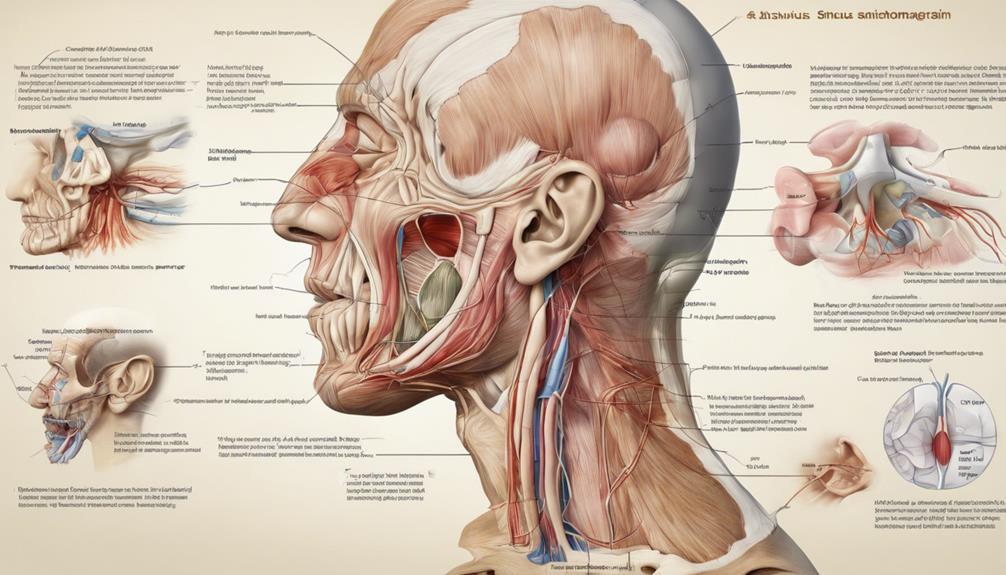
Understanding the intricate connection between sinusitis and hearing loss is essential for effectively managing and treating related issues. Sinusitis, characterized by inflammation of the sinuses, can have a significant impact on hearing due to its effects on the Eustachian tube and middle ear. When sinuses become swollen, they can block the Eustachian tube, leading to pressure changes within the ear and causing ear pain and potential hearing impairment.
Additionally, fluid accumulation resulting from sinus infections can further compromise hearing, potentially leading to permanent hearing loss if not promptly addressed. Seeking timely intervention from an ENT specialist is crucial in addressing sinusitis-related hearing issues, as proper treatment of sinus infections is vital for preventing complications like hearing loss.
Symptoms of Sinusitis-Related Hearing Issues
Experiencing symptoms of sinusitis-related hearing issues can be distressing and impact daily activities. When sinusitis strikes, it can bring about a range of aural symptoms that may include ear pain, feelings of pressure in the ears, and a sense of muffled hearing.
Additionally, individuals may encounter bothersome ringing in the ears known as tinnitus, episodes of dizziness, and a feeling of imbalance. These symptoms often arise due to blocked Eustachian tubes resulting from sinus inflammation, which can lead to temporary hearing loss.
The sensation of fullness in the ears caused by sinusitis can further disrupt sound transmission, making it challenging to hear clearly. Fortunately, seeking prompt treatment for sinusitis not only addresses the underlying cause but also helps alleviate associated hearing issues.
Effective management of sinusitis can prevent potential long-term complications and restore optimal hearing function, allowing individuals to regain their quality of life.
Managing and Preventing Sinusitis-Induced Hearing Loss
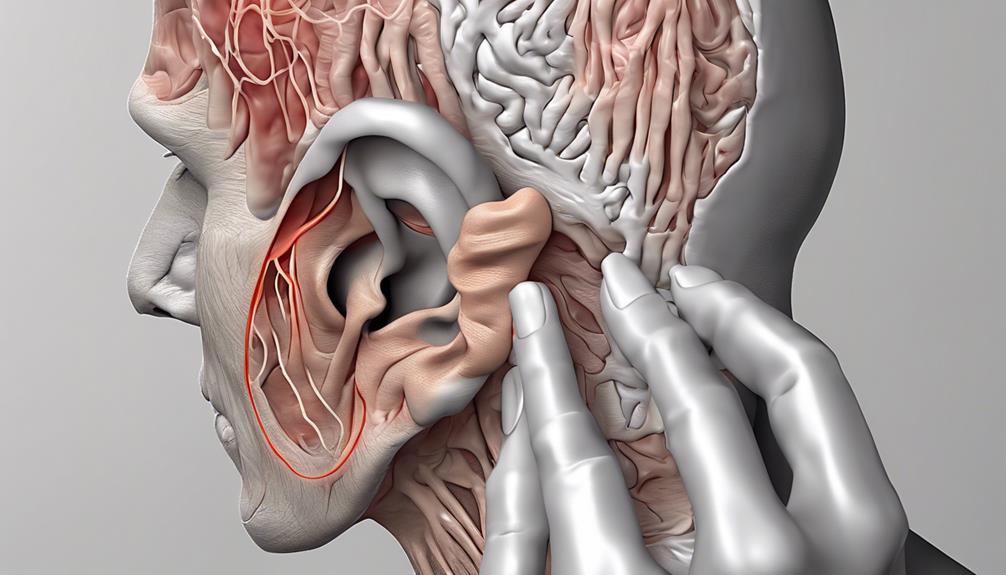
Navigating through sinusitis-induced hearing loss can be a challenging journey, but with proper management and preventative measures, optimal hearing function can be restored.
Here are some key strategies to help you effectively manage and prevent sinusitis-induced hearing loss:
- Seek Treatment for Sinus Infections:
Addressing sinus infections promptly with appropriate medications and saline sprays can help alleviate Eustachian tube dysfunction, which often contributes to temporary hearing loss associated with sinusitis.
- Address Chronic Sinusitis:
Chronic sinusitis left untreated can progress to permanent hearing loss. It's essential to consult with an ENT specialist to develop a comprehensive treatment plan to manage chronic sinusitis effectively and preserve hearing health.
- Consider Balloon Sinuplasty:
For individuals with chronic sinusitis-induced hearing issues, balloon sinuplasty may offer a minimally invasive treatment option to improve sinus drainage and alleviate related hearing problems.
- Regular Monitoring:
Regular check-ups with your ENT specialist can help monitor your sinus health and address any potential hearing issues promptly, ensuring optimal hearing function is maintained.
Expert Tips for Dealing With Sinusitis-Related Hearing Problems
When encountering sinusitis-related hearing problems, seeking guidance from medical professionals can significantly enhance your journey towards effective management and relief. Sinusitis can lead to hearing loss by causing Eustachian tube dysfunction, where swelling and inflammation from sinus infections block the middle ear, disrupting sound transmission.
To address these issues, it's crucial to treat sinus infections properly to prevent further complications with hearing. Consulting with an Ear, Nose, and Throat (ENT) specialist is recommended for effectively managing sinusitis-related hearing problems. Timely intervention and appropriate care play a vital role in alleviating sinus-related hearing complications.
Frequently Asked Questions
How Does Sinus Infection Cause Hearing Loss?
When sinus infection strikes, it can lead to hearing loss due to Eustachian tube dysfunction. Sinus swelling causes pressure changes in the middle ear, affecting our hearing ability.
Fluid buildup further complicates matters, potentially resulting in persistent hearing difficulties. Neglecting chronic sinusitis may even lead to irreversible hearing loss.
Seeking timely treatment for sinus infections is crucial in safeguarding our hearing health.
What Does an ENT Do for Chronic Sinusitis?
ENT specialists for chronic sinusitis can perform endoscopic sinus surgery to enhance drainage and reduce inflammation. They may prescribe antibiotics, steroids, or allergy meds to manage symptoms effectively. Treatment methods also include addressing nasal polyps through medication or surgery.
Allergy testing and immunotherapy can help manage underlying allergies. In severe cases, options like balloon sinuplasty or functional endoscopic sinus surgery may be recommended to alleviate symptoms.
How Can I Regain Hearing After a Sinus Infection?
Ironically, regaining hearing after a sinus infection can be quite the challenge. However, with proper treatment and guidance from an ENT specialist, we can tackle this hurdle effectively.
Consider using decongestants and mucolytics to reduce fluid buildup in the ear post-infection. In cases of chronic sinusitis affecting hearing, balloon sinuplasty may be a viable option.
How Do You Unclog Your Ears From Congestion?
When dealing with ear congestion, we can unclog our ears from congestion caused by sinusitis through simple techniques.
Yawning or swallowing can open the Eustachian tube, while the Valsalva maneuver helps equalize ear pressure.
Applying a warm compress can provide relief and using over-the-counter decongestants or nasal sprays can reduce inflammation.
If the congestion persists, it's wise to seek professional advice for proper evaluation and treatment.
Conclusion
As we've explored the connection between sinusitis and hearing loss, it's clear that early recognition and proper management are key.
By understanding the symptoms and seeking timely medical attention, we can address sinusitis-induced hearing issues effectively.
Remember, taking care of your sinuses means taking care of your ears.
Stay tuned for more expert tips on how to navigate sinusitis-related hearing problems and maintain optimal ear health. Your well-being is our top priority.

